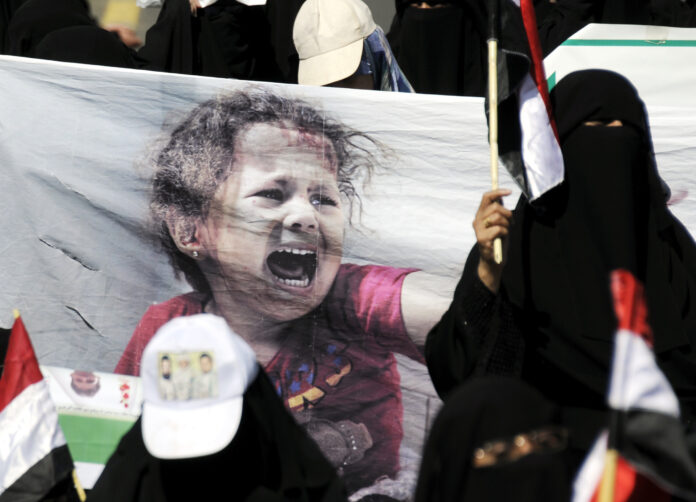
WHAT ONLY WAY TO END THE WAR IN YEMEN?
YemenExtra
M.A.
Written by Mona Zaid
For four and a half years, Saudi Arabia has insisted, with diminishing credibility, that military victory was imminent; and for just as long, the United States and other powers have largely turned a blind eye to the intervention’s consequences.
But the murder of the journalist Jamal Khashoggi at the Saudi consulate in Istanbul in October has focused the world’s attention on the kingdom’s reckless conduct—including its disastrous war in Yemen.
There is only one expeditious way for Saudi Arabia to end this war, and that is to stop its military campaign.
The decision by the United States to stop refueling warplanes of a Saudi-led coalition fighting in Yemen was welcomed by Yemeni officials, human rights activists and aid workers.
It also sent a strong signal, they said, about Washington’s increasing unease over airstrikes by its closest Middle East allies that have killed thousands of civilians in Yemen.
But those interviewed said the decision is unlikely to rein in the coalition — unless firmer action is taken. Nor will it alone change the trajectory of Yemen’s war, they said, or its growing humanitarian crisis, which now includes more than 14 million people on the brink of famine — more than half of Yemen’s population.
The United States, Britain and other Western powers continue to assist the coalition with intelligence, logistical support and sales of billions of dollars in weaponry, much of it being used in the conflict in Yemen, the Middle East’s poorest nation.
“The U.S. decision to stop refueling coalition aircraft is significant because it implies that the U.S. is trying to distance itself from the devastating impact on civilians of poorly targeted airstrikes,” said Elisabeth Kendall, a Yemen scholar at Oxford University. “But it is not a military game changer.”
Said the official, Mohammed Albukhaiti. “The siege on Yemen is a U.S. and Western siege because such a siege is beyond the capabilities of Saudi Arabia and the UAE.”
The U.S. refueling of coalition aircraft has long been controversial because of the large numbers of civilians that have been killed in coalition airstrikes.
Coalition airstrikes have struck hospitals, health clinics, weddings, funerals, factories and other nonmilitary targets. Human rights groups and The Washington Post have observed fragments of U.S.-made munitions at numerous attack sites.
After each airstrike, Yemenis often blame the United States.
The mounting civilian death toll, despite promises by the coalition to be more careful in its targeting, brought increasing focus on ending the U.S. refueling from U.S. lawmakers who are seeking to curb arms sales to Saudi Arabia and end U.S. involvement in Yemen’s war.
In recent congressional hearings, it became clear that the Pentagon had little oversight of Saudi Arabia’s military activities in Yemen.
“The U.S. has an opportunity to continue taking steps that make a very real difference for people in Yemen,” said Suze van Meegen, protection and advocacy adviser in Yemen for the Norwegian Refugee Council.
Among those steps, she said, were “pushing for an immediate cease-fire” and making sure that “all seaports and airports in the country are open and functioning, allowing for the swift transportation of food, fuel and people in need of medical treatment.”
A senior U.N. official says he believes Yemen’s warring parties want to find a political solution to end more than four years of war.
U.N. Special Envoy for Yemen Martin Griffiths remains optimistic that peace in Yemen is possible despite setbacks in mediation efforts.
He acknowledges that steps for winding down the conflict, accepted under December’s Stockholm Agreement in Sweden, have not been implemented. Nevertheless, he says both the Hadi government and Houthi continue to insist they want a political solution.
The United Nations envoy for Yemen has welcomed an offer from the country’s Houthi to halt all attacks on Saudi Arabia, saying it could bring an end to years of bloody conflict.
Implementation of the initiative by the Houthis “in good faith could send a powerful message of the will to end the war,” special envoy for Yemen Martin Griffiths said.
Mr Griffiths might have been too eager to place his trust in the government Hadi, but he is not to blame for the continuation of this crisis.
Amid the political deadlock, it is ordinary Yemenis who continue to suffer. According to the Norwegian Refugee Council, at least 250,000 people have been displaced in the six months since the Stockholm agreement was signed.
Mr Griffiths said also reflect on hundreds of days of failure – and one day of success.
All sides should be committed to finding a solution, to alleviate the extreme suffering in Yemen.
Beneath the bluster, all sides know that a political solution is the only option moving forward. The bloodshed and turmoil in Yemen will continue until that point is reached.
Griffiths says a political solution to end this catastrophic war must be found soon. He says the war is becoming more complex and fragmented and the appalling humanitarian situation in Yemen continues to worsen.
“There are many wars in Yemen, and the longer this goes on, not only is it the longer that people will die from hunger and conflict, but that the solution becomes more difficult.
The fragmentation of Yemen is an alarming trend,” he said.
Griffiths warns the longer war goes on, the greater the possibility that Yemen could be dragged into a regional conflict. He says the likely consequences of that are too awful to contemplate.
